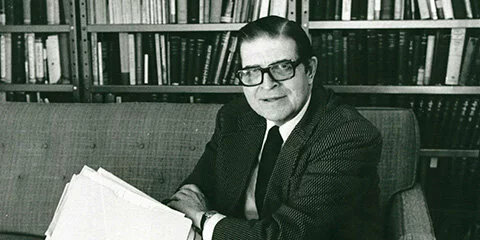Carl F. H. Henry
Carl F. H. Henry was one of the founding architects of the modern evangelical movement in the United States. He was a theologian, editor, and professor.

We must confront the world now with an ethics to make it tremble, and with a dynamic to give it hope.
Carl F. H. Henry
Legacy
From the beginning of his academic career Henry aspired to lead Protestant fundamentalism to a greater intellectual and social engagement with the larger American culture. As such, with Ockenga and Graham, he is one of the most significant leaders of evangelicalism of the post-World War II era. In fact, Henry’s book The Uneasy Conscience of Modern Fundamentalism (1947) is often seen as a kind of “neo-evangelical manifesto” marking the nascent movement’s break with separatist fundamentalists. Henry also demonstrated his leadership of the neo-evangelical movement through his presidency of the Evangelical Theological Society (1967-70) and the American Theological Society (1979-80), as well as his organizing role in the Berlin (1966) and Lausanne (1974) World Conferences on Evangelism.
Henry’s many books, the most famous of which is the six-volume God, Revelation, and Authority (1976–83), consistently reiterate the themes of biblical theism,
objective revelation in propositional form, the authority and inerrancy of the Scriptures, and the rational apologetic defense of Christianity.
Paradoxically, Henry has been attacked throughout his career by separatist fundamentalists for urging a more
united evangelical witness, while being criticized by liberal evangelicals for his insistence on biblical inerrancy. Despite this carping, the historical significance of the person Time magazine once called in
1977, “the leading theologian” of American
evangelicalism is incontestable.
Bibliography
This bibliography was created and compiled by Stephen Spencer, a theological librarian and an avid Carl Henry scholar.
Reception
Carl F. H. Henry, by Bob E. Patterson. Waco, TX: Word Books, 1983.
God and Culture: Essays in Honor of Carl F. H. Henry, ed. by D. A. Carson and John D. Woodbridge. Grand Rapids, MI: Eerdmans, 1993.
Recovering Classical Evangelicalism: Applying the Wisdom and Vision of Carl F. H. Henry, by Gregory Alan Thornbury. Wheaton, IL: Crossway, 2013.
Sharp, Larry D. “Carl F. H. Henry: Neo-Evangelical Theologian.” D. Min. thesis, Vanderbilt University, 1972.
Purdy, Richard A. “Carl Henry and Contemporary Apologetics.” Ph.D. dissertation, New York University, 1980.
Dempster, Murray W. “The Role of Scripture in the Social Ethical Writings of Carl F. H. Henry.” M.A. thesis, University of Southern California, 1969.
Anderson, Randall. “The symbolic processing of continuity and change using the case of Carl F. H. Henry.” Ph.D. dissertation, Ohio State University, 1983.
Porter, Daryl A. “Christianity Today: Its History and Development, 1956–78.” Th.M. thesis, Dallas Theological Seminary, 1978.
“Towering Theologian: Carl F. H. Henry,” in The Overcomers, by Russell Chandler. Old Tappen, NJ: Fleming H. Revell Co., 1978, pp. 26–39.
Ambassadors for Christ: Distinguished Representatives of the Message Throughout the World. Chicago: Moody Press, 1994. “Carl F. H. Henry: Leader of American Evangelicalism,” pp. 73–77.
“Carl F. H. Henry: Christianity Today,” in The Politics of Morality: Portraits in Seven Lives, by J. David Woodard. South Bend, IN: St. Augustine’s Press, 2014.
The New York Times: Rev. Dr. Carl F. H. Henry, 90, Brain of Evangelical Movement
Los Angeles Times: Carl F.H. Henry, 90; Theologian Was a Key Evangelical Influence
Christianity Today: The Carl Henry that Might Have Been (by Kenneth Kantzer)
Christianity Today: Carl F.H. Henry, Theologian and First Editor of Christianity Today, Dies at 90
Wheaton: Carl F. H. Henry, 1913-2003 – Memorial Page
Al Mohler: The Life and Legacy of Carl F. H. Henry: A Remembrance
Associated Baptist Press: Carl F. H. Henry, famed theologian, evangelical journalist, dies at 90
Baptist Press: Carl F.H. Henry, ‘dean’ of evangelical theologians, dies at 90
World Journalism Institute: Journalistic Truth in a Postmodern Age (Carl F.H. Henry)
Atl.obituaries: Carl Henry, first editor of Christianity Today
Christianity Today: The Man Who Birthed Evangelicalism
The Gospel Coalition: Happy 100th Birthday, Carl F. H. Henry
Russell D. Moore: Happy 100th Birthday Carl F.H. Henry
John Fea: Timothy George on Carl F.H. Henry’s Legacy
Moral Minority: Carl Henry centennial
The Touchstone Blog: Carl Henry and Christian Social Witness
Digging Deeper Through Stories: January 22 – 100th Anniversary of Carl Henry
Tim Brister: Happy 100th Birthday, Carl F.H. Henry!
Down by Abby: Spotlight on Carl Henry
Helwys Society Forum: The Uneasy Conscience of Modern Fundamentalism
Exclusive Sermons and Lectures
Carl F. H. Henry, “The New Image of Man,” (Sermon given at Trinity Evangelical Divinity School’s Alumni Institute, Deerfield, IL, April 1976).
ListenCarl F. H. Henry, “How to Hold it All Together,” (Sermon given at Trinity International University, Deerfield, IL, August 8, 1978).
Carl F. H. Henry, “Can an Intellectual Be Reborn?” (Sermon given at Trinity International University, Deerfield, IL, August 5, 1979).
Carl F. H. Henry, “The Greatness God has prepared for us,” (Sermon given at First Baptist Church, Conway, AR, November 11, 1979).
ListenCarl F. H. Henry, “The Greatest Interview of All Time,” (Sermon given at First Baptist Church, Conway, AR, November 11, 1979).
ListenCarl F. H. Henry, “The Enduring Greatness of Abraham,” (Sermon given at First Baptist Church, Conway, AR, November 12, 1979).
ListenCarl F. H. Henry, “Jesus’ Legacy to his Disciples,” (Sermon given at First Baptist Church, Conway, AR, November 13, 1979).
Carl F. H. Henry, “The Issue of Inerrancy,” (Sermon given at First Baptist Church, Conway, AR, November 14, 1979).
Carl F. H. Henry, “Priorities for the Eighties,” (Sermon given at First Baptist Church, Conway, AR, November 14, 1979).
Carl F. H. Henry, “In Search of a Happy Ending,” (Sermon given at First Baptist Church, Conway, AR, November 14, 1979).
ListenCarl F. H. Henry, “God the Sovereign Creator,” (Sermon given at Westminster Chapel, London, United Kingdom, September 6, 1981).
ListenCarl F. H. Henry, “The Greatest Text on Freedom,” (Sermon given at Westminster Chapel, London, United Kingdom).
ListenCarl F. H. Henry, “The Splendor of the Bible,” (Sermon given at Westminster Chapel, London, United Kingdom, September 13, 1981).
Carl F. H. Henry, “The Risen Christ and the Radiant Church,” (Sermon given at Westminster Chapel, London, United Kingdom, September 13, 1981).
ListenCarl F. H. Henry, “The Neo-Paganism: Life Without the Emmanuel Factor,” (Sermon given at the Southern Baptist Convention Pastor’s Conference, St. Louis, MO, June 1987).
ListenCarl F. H. Henry, “Relating Man in the Image of God to the Health Sciences,” (Sermon Given to the Christian Medical Society at Gordon College, Wenham, MA, June 2, 1988).
ListenCarl F. H. Henry, “Evangelicals: Who They Are and What They Believe,” (Lecture Given at Evangelical Affirmations Conference, Trinity Evangelical Divinity School, Deerfield, IL, May 15, 1989).
Carl F. H. Henry, “Plenary Session #10,” (Lecture Given at the Evangelical Affirmations Conference at Trinity Evangelical Divinity School, Deerfield, IL, May 17, 1989).
Carl F. H. Henry and Kenneth Kantzer, “Turning Points in the History of Evangelicalism, 1945-1990,” (Lecture Given at Christian Thought Lectures at Trinity Evangelical Divinity School, Deerfield, IL, April 30, 1991).
Carl F. H. Henry, Kenneth Kantzer, and D. A. Carson, “Evangelicalism: Past, Present, Future,” (Lecture Given at Christian Thought Lectures at Trinity Evangelical Divinity School, May 1, 1991).

Following Henry’s Example
The Henry Center is not dedicated to the mere propagation of Carl Henry’s specific thoughts. Instead, we embrace his broader persona as evangelicalism at its best. His belief in the mutual necessity of theological competence and cultural engagement stands as a beacon to us. As historian John Woodbridge once said, “Dr. Henry was the ‘Great Recoverer’ of social justice and the gospel and the relationship between them.” We strive to emulate his dedication to theology, active engagement with pressing issues, and unwavering commitment to the gospel.
